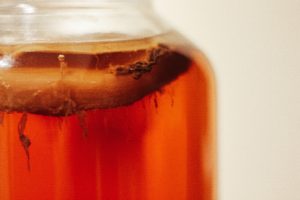When I first discovered kombucha on a trip to Boston, I was on an extreme health kick and tried it for it the supposed health benefits. We didn’t have kombucha yet in the country I lived in, but after returning home and convincing a local grocery store to bring it in, I was able to get my hands on the fermented beverage once again. As is with my excitement for most food products foreign to me, I began to over indulge. It was for good reason though, as I was trying to give up my addiction to Diet Coke. The fizziness of a kombucha seemed to do the trick.

Of course at around $6 a pop, I was soon having two a day (some days more) and spending a ton of money on my new addiction. It was within that year that I began to notice recurring urinary tract infections—the worst I’ve ever experienced, and went to the emergency unit at the hospital to treat it.
Flash forward another few months and my kombucha habit had slowed to just one bottle per day—which scientists say is the healthy and recommended serving size for the beverage. Eventually, the cost of it got to me, as well as drinking one too many that had lost its fizz (nothing quite as dissatisfying as a flat kombucha, am I right?), and my habit slowed to an occasional indulgence. After a long period of not drinking kombucha and then having one, I noticed that familiar, dreaded UTI feeling and wondered if the two were somehow connected.

According to Healthline, “kombucha is unpasteurized and contains a mix of different types of bacteria and yeast [which] can promote the growth of opportunistic bacteria that can lead to infections in some people.” But kombucha contains a ton of the good type of bacteria, Lactobacalli, which have been proven to have a strong inhibitory effect on E. coli (the most common culprit of UTIs). DuPrey et al. discovered that “although rare, lactobacalli have been reported to cause infection in susceptible individuals with immune compromising conditions” like diabetes and cancer.

The Duprey et al. study lists UTIs as one of the infections possibly resulting from an excess of Lactobacalli. Although commonly known as the “good bacteria,” an overgrowth of Lactobacalli can sometimes seriously infect the urinary tract, blood streams, and vagina.
On the other hand, some studies suggest supplementing with probiotics like Lactobacallus can decrease the risk of UTIs by inhibiting the growth of bad bacteria. It’s especially recommended for women with “recurrent, complicated UTIs or prolonged antibiotics use,” according to this 2017 study.
Probiotics consist of live bacteria or other microorganisms that are meant to colonize the gut and outcompete the “bad” bacteria. According to MDLinx, our “bodies contain a plethora of bacteria that are essential for our survival.” But, even this website warns to not take them if you have a compromised immune system (possibly from being exposed to certain STDs, or if you have diabetes, cancer or have undergone surgery).

There are other reasons to be careful with taking probiotics as well, such as their ability to evolve in our gut and develop antibiotic resistance as well as adapt to growing on a larger number of sugars which thus allows them to stay in the gut longer, ultimately leading them to compete with our natural existing gut flora.
As the key to everything seems to be, balance is what comes up as the best way to move forward. For some, taking probiotics is a saving grace for their IBS and for their UTIs as well. But this study also shows that “in some cases, probiotics may lead to the production of toxins” and conditions like bacteraemia, which is a bacterial infection that has spread to the blood stream.
While the introduction of probiotics seems to work for some conditions for the majority of people, it’s important to keep tabs on yourself individually. The health claims for probiotics are fantastic but as usual, it may be best to ask a medical professional before starting any new healthcare regime.
Get more like this—Sign up for our daily inspirational newsletter for exclusive content!
__
Photo: Nachev, Kavis, Nix, Nolen, Metz; Unsplash.




